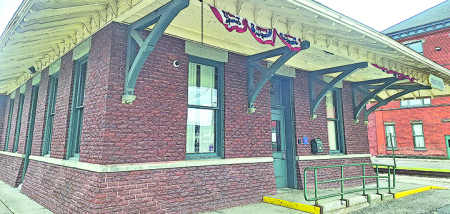Oxford Residents Weigh-in On Upcoming Elections; Hydraulic Fracturing
Published:
August 13th, 2013
Do you feel guilty when someone else's tragedy makes you appreciate your own good fortune? That's how we felt in early July when we saw The Evening Sun photograph of the horrible railroad explosion and devastating fire in Lac-Mégantic in Quebec, Canada. Lac-Mégantic (pronounced lock-megan-TEEK) was a picturesque rural village 150 miles east of Montreal just west of the Maine border.
Before the runaway oil tanker train derailed, igniting explosions and fires that destroyed the downtown and 40 homes, Lac-Mégantic looked like Oxford Village. Proud church steeples towered above tree-lined streets with single family homes nestled among rolling green hills. A century-old railroad track ran right through the middle. Like Oxfordians, the residents never worried about the railroad in their peaceful town before a wall of flaming crude oil incinerated 50 of their neighbors.
Where there were houses in Lac-Mégantic before Saturday at 1:14 a.m., July 6, there are now a few blackened bricks. All that remains of entire blocks before the runaway train jumped the tracks and burst into flames are strands of twisted metal. Century-old majestic trees are now charred stumps and matchstick branches. Along the village’s river view boardwalk, melted steel frames are left where park benches used to seat elderly folks and young lovers.
The once thriving restaurants and businesses that included the Musi-Café, a library, a real estate office, a funeral parlor, and picturesque clapboard cottages and homes are now black debris. Does that neighborhood remind you of Fort Hill Park, our library, churches, Middle School, firehouse and the railroad depot home to our own Oxford historical society--all located a few hundred feet from our presently unused rail tracks?
Diane Roy is the chairwoman of Lac-Mégantic’s library board. Her three employees and 45 volunteers were getting ready to move 60,000 books and precious archives from the two-floor building near the railway to a bigger and more convenient location. Like our Oxford Memorial Library, it housed their community's documented history. High school students could view baptism records that came over with colonists from France in the 17th century.
But one archival collection was particularly dear to the librarian's heart.
A local newspaper reported her sorrow.
“For the longest time, I kept at my home letters my uncle had written to my grandmother when he was a prisoner of war during World War II,” said Roy, 65, her voice breaking. “But then, just recently, I brought them to the library so my uncle’s grandchildren would be able to view them whenever they wished. I was actually scared they might get destroyed in a fire if I kept them in my house.”
Now, nothing remains of Lac-Mégantic's library but memories, tears and ashes.
The Musi-Café – like Oxford's popular Stadium Sports Bar, Roma’s, Hoppie's, and 6 On the Square – was crowded with people when it was vaporized by exploding fossil fuel that sent a fireball 200 hundred feet into the air.
Most of the homes destroyed by the blast no longer exist. “The houses have completely disappeared,” said a rescue worker. “There is nothing left. Not even a book or a piece of paper.”
“There are still cars filled with gasoline,” said Sûreté du Québec Sgt. Michel Brunet later about the hazardous scene. “There are still 10 to 15 buildings that have six feet of fuel in the basement. We have to empty all of them to see if there are any bodies in there.”
Before that Saturday morning, these “bodies” had names, joys, dreams, disappointments. Now hundreds of rescue workers are using garden rakes to find their remnants. Families of the missing were asked to produce personal items that could contain the missing person’s DNA, such as baseball caps, toothbrushes, razors and combs. Lives gone; dreams shattered.
Many of us have dreamed of a quiet commuter and sightseeing train running through the Village and Town of Oxford along revitalized Utica-Binghamton railroad tracks. Modern technology enables electric trains to run on renewable energy. Rail lines can be community-owned and publicly regulated utilities.
Lawrence Wilcox, an Oxford gas lease-holder, is Chair of the Chenango County Board of Supervisors. Did you know that his County Board is aggressively seeking to "revitalize" the Susquehanna & Western Railroad with public funds but under corporate ownership and explicitly to transport loaded tankers for the area's expected fracking boom? Compressed, liquified "natural" gas is infinitely more volatile than crude oil. Imagine what would remain of Oxford if 72 railroad tanker cars of compressed methane exploded downtown? What if a packed east side Oxford Academy school bus was patiently waiting at the crossing for the train to pass?
Quebec's deadly train derailment dumped tons of crude oil into the nearby Lake Mégantic and the Chaudière River in what officials call an unprecedented environmental disaster for the province. Rescue efforts were hindered by toxic fumes, volatile chemicals, and soil deeply contaminated by oil and benzene.
Officials issued a boil-water advisory for the whole town. Widely circulated photos showed gobs of gooey brown oil in the Chaudière River. The toxic fallout from the sky prompted Quebec Public Security to urge residents to wash thoroughly vegetables grown in their private gardens.
Canadian environmental groups say that the cancer-causing impact on the region's water and air will last for many years. A representative warned, "It gets into the ecosystem, it gets into the water, it gets into the soil," he told the Montreal Gazette. "Depending on the amount of oil spilled, the effects can be big, and they can mitigate the damage but not get rid of them entirely.”
What did the good citizens Lac-Mégantic do to deserve this fate?
Nothing.
What can Chenango County residents do to avoid a railroad catastrophe like theirs?
Plenty, starting the minute you lay down this newspaper.
The folks in little Lac-Mégantic entrusted their lives and property to their government representatives and outsiders. They assumed the railroad's owners were as concerned about human safety as corporate profits. They were wrong, and so are Chenango County's boosters of giant gas drilling and transportation corporations.
The terror train was owned by the Montreal, Maine & Atlantic Railway company with headquarters in the United States. It had five engines, a buffer car and 72 tank cars loaded with 50,000 barrels of crude oil and chemicals fracked from North Dakota's Bakken shale. After the ill-fated train left the American fracking fields, it passed through Minneapolis, Chicago, Detroit, Toronto and Montreal on its way to a refinery in Saint John, New Brunswick.
In 2010, the corporation cut the number of workers it employs to man its trains in half.
The company saved $4.5 million by cutting its crew members in Canada and the United States from two conductors down to one. How could a kilometer-long train carrying deadly cargo over long distances legally be tended by only one employee? How could he be legally permitted to leave the train unattended overnight to sleep in a local hotel?
The recklessness of today's North American corporations is no accident. As the rich get richer, the poor poorer, and the middle class disappears, corporate lobbyists have plenty of money and power to eliminate environmental, labor and safety standards and oversight. They have felt free to institute massive lay-offs to maximize profits. Inspectors later found loose rails and rotten timber along the Lac-Mégantic tracks.
Another clear safety oversight is the continued use of DOT-111 tanker cars to carry oil and gas despite repeated warnings from inspectors. Canada’s Transportation Safety Board put it bluntly in a 2009 report: “The susceptibility of 111A tank cars to release product at derailment and impact is well documented. The transport of a variety of the most hazardous products in such cars continues.”
These tankers make up about 70 percent of the U.S. and Canadian fleet. Since 2009, the number of train cars carrying fossil fuel hauled by major railroads jumped from about 10,000 a year to a projected 200,000 last year and thousands more in 2013. There is legally nothing to prevent these same rail tankers speeding crude oil, methane, deadly chemicals and fracking fluid through Utica, Sherburne, Norwich, Oxford, Greene, Sidney and Binghamton.
As one American official complained, “We have very limited regulatory authority over rail, and this is true for all of the states. We can’t tell railroads where they can take freight, [and] we can’t tell railroads what they can bring in as freight. Because the railways are governed exclusively at the federal level; we’re pre-empted.”
Another reported, "They've been using old rail cars to ship oil, despite the fact that regulators warned the federal government they were unsafe, as far back as 20-plus years ago.” A more recent report by a federal agency reminded the government that the cars could be "subject to damage and catastrophic loss of hazardous materials." All these official warnings were ignored by greedy petroleum executives.
What can we do? Remember, we the people … which includes those of us who are part of a village, town, and county. Little communities like Lac-Mégantic and Oxford have to look out for our own interests and we have to elect local leaders willing to do so and to vote out of office those who will not. Ironically, Quebec province is one of the few places in Canada that currently bans the "fracking" that was used to extract the Dakotan oil, poisonous chemicals and benzene that devastated Lac-Mégantic.
Yes, we felt guilty when the tragedy in Lac-Mégantic made us appreciate our own good fortune. But then we realized that Oxford Village's new zoning laws, passed in February prohibiting the transportation and storage of explosive methane and carcinogenic frack fluid, were not the result of dumb luck. They were the result of our neighbors educating themselves about the dangers of fracking. We elected Village Mayor Terry Stark and the enlightened Village Board. They listened to the community's concerns and answered every one of our questions about gas drilling. They took the courageous step of enacting the first – and so far only – ban on gas drilling in Chenango County.
But we live in a democracy. Not every villager agreed with the board. In June, a slate of write-in candidates, generally thought to be pro-fracking, challenged three incumbents. In a record-breaking voter turnout, these local gas supporters were overwhelmingly defeated.
Now Oxford faces another contested election, this time for Oxford Town Supervisor and two seats on the Town Board. Both Village and Town residents vote for these positions. Over the past year, the present town board members – including three lease holders – have refused to answer more than one hundred written questions about the possible risks of gas drilling to our air, water, soil, health and safety.
We all need to participate in this election.
Paul Brennan and Ron Charles are challenging incumbent John Hofmann in the Town Republican Primary on September 10. Hofmann holds a gas lease with Chesapeake Energy. At a recent board meeting, a citizen reminded him that Chinese investors had recently purchased major shares in Chesapeake and asked if he was looking forward to profiting from selling gas to China. If we misunderstood his tape-recorded, enthusiastically affirmative answer, he should clarify his position on self-interest vs. common good.
Brennan and Charles will need Village votes to win the Republican Primary. Where do these two candidates stand on transporting gas by rail through the Town and Village? On fracking our town?
According to last week's Evening Sun, Oxford Town Supervisor Lawrence Wilcox – a Norse Energy gas lease holder – actively supports reviving the railroad. Where does he stand on transporting gas, deadly chemicals and frack fluid through Chenango County? Retired Oxford teacher and historian Fred Lanfear is challenging Wilcox for Supervisor. Where does he stand on gas drilling?
Last year, our Oxford Town and Village boards spent $10,000 for SUNY Syracuse faculty and graduate students to meet with dozens of Oxfordians, including high school students representing our future, to begin revising our joint Comprehensive Plan. Those of us who participated prioritized the following goals:
"Establish a locally based economy that is creative, diverse and sustainable, and provides employment opportunities for a range of skill and education levels, and ... Commence a transparent and respectful process of facilitated community dialogue about hydraulic fracturing as part of the economic development plan for the Town."
If you care about our community and future generations, share your ideas about the Comprehensive Plan with the boards, register to vote, contribute your time and money to candidates who share your values and go to the polls on September 10 and November 5.
Although we never knew the victims of Lac-Mégantic, an informed and responsible electorate is the best way to honor them.
(A dozen Oxford residents contributed to this opinion piece. You will find links to the multiple sources used at OxfordVisionaries.org/commuter-express-or-terror-train. You can contact the Oxford 2013 Election Journal writers at info@OxfordVisionaries.org. Join the discussion! Send your comments to Brian Golden, Editor, at bgolden@evesun.com or visit www.evesun.com and post to ‘30 Seconds’ online.)
Comments










